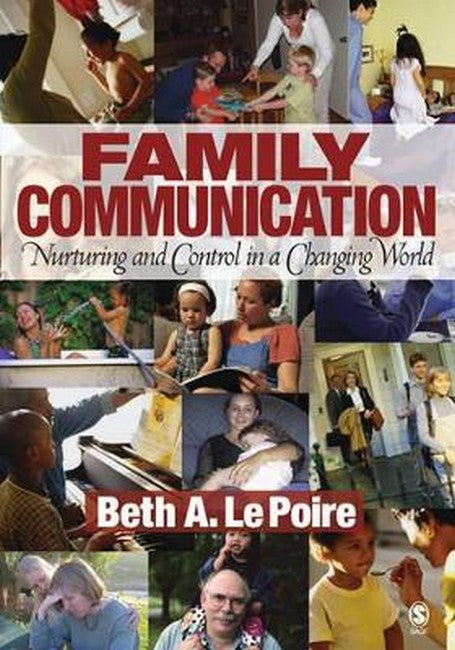Beth Le Poire (Ph.D., University of Arizona; M.A., University of Arizona; B. A., California State University, Stanislaus) is full professor in the department of communication at the University of California, Santa Barbara. She has 40 published works across com-munication in such journals as Human Communication Research and Communication Monographs. In family communication, her work looks specifically at parental and romantic attachment and the influence of partners on continued problematic behavior in the family (e.g., substance abuse). She has presented more than 70 conference presentations and has been the recipient of 14 top paper awards across national and international conventions. She has also been the recipient of the National Communication Associa-tion's Golden Anniversary Monograph award. She is just completing her editorship of Communication Reports and serves on 8 editorial boards including Human Communication Research, Communication Monographs, Communication Quarterly, and Journal of Communication. She has taught family com-munication since 1995 to more than 1,200 students.
Request Academic Copy
Please copy the ISBN for submitting review copy form
Description
Introduction 1. Introduction: Families, Communication, and Family Communication Families Communication Family Communication Why Communication is Central to Families Summary Key Terms Questions for Application 2. Family Forms in Our Changing Society Introduction - The Family Context Societal Influences on the Family Form Family Forms Summary Key Terms Questions for Application 3. Theoretical Approaches to Understanding Communication in the Family Introduction of Theory Roles Theory Family Systems Theory Rules Theory Summary Key Terms Questions for Application 4. Forming the New Family Pairing - Two Become One Social Psychological Bases of Attraction Psycho-Analytic Bases of Attraction Relational Stages of Development Summary Key Terms Questions for Application 5. Communication in the Newly Formed Family - Adding Children The Effects of Pregnancy on Communication Addition of the Child and Changes in Communication Communication in Sibling Relationships Adding Children Through Remarriage: Communication in the Step-Parent-Step-Child Relationship Summary Key Terms Questions for Application 6. Nurturing and Controlling Communication: Raising Socio-Emotionally and Intellectually Competent Children Control - Providing Discipline and Guidance through Communication Nurturing - Providing Support and Love Summary Key Terms Questions for Applications 7. Nurturing Communication in Marital Relationships: Encouraging Closeness, Stability, and Satisfaction through Communication Introduction Maintaining Closeness in Marital Relationships The Communication of Closeness in the Marital Relationship Factors Related to Marital Satisfaction which May Affect Marital Communication Summary Key Terms Questions for Application 8. Control in Marital Relationships and the Family Introduction The Nature of Conflict Models of Conflict Conflict Styles Conflict Strategies (Interpersonal Influence Strategies) The Nature of Violence Summary Key Terms Questions for Application 9. Nurturing and Controlling Communication Surrounding Undesirable Behavior in the Family Introduction Undesirable Behavior in the Family The Potential Role of Communication and Problematic Behavior in Families Family Systems Theory Coercion Theory Inconsistent Nurturing as Control Theory Key Terms Questions for Application 10. Family Communication: Providing Nurturing and Control in a Changing World Introduction - What We Have Learned The Current Configuration of Families: Nurturing and Controlling Communication Improving Family Communication Summary Key Terms Questions for Application

